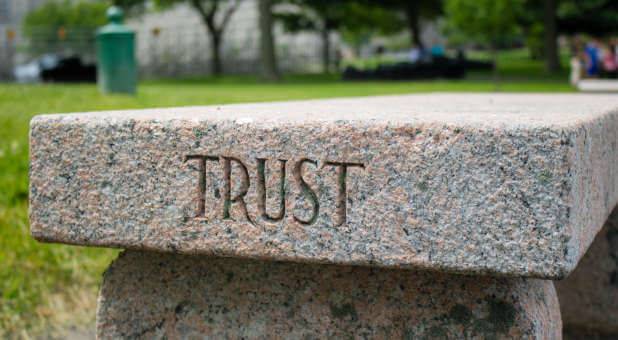If you are like most believers, the past year has caused you to have some trust issues. It seems as if between politics, culture wars, inequality, failures of faith leaders, mixed messages by doctors and all that is COVID, most of us have come to a place where we are questioning our leaders in nearly every aspect of our lives.
I was in prayer concerning this loss of trust in human authority that has become very real in the body of Messiah. As I prayed, my attention was drawn to Psalms 146:3 (TLV): “Do not put your trust in princes—in man, in whom there is no salvation.”
As these words became planted in my soul, my heart became encouraged in their message. As you read these words today, please don’t misunderstand their meaning. These words are not saying that we should never trust men.
What would the world be like if we could never trust our parents, teachers, political leaders, military commanders or doctors? Where would we be as the body of Messiah if we could not trust our faith leaders? After all, Ephesians 4:11 tells us that G-D Himself gave us “some to be emissaries, some as prophets, some as proclaimers of the Good News, and some as shepherds and teachers to equip the kedoshim for the work of service, for building up the body of Messiah.”
The issue isn’t trusting; it is in how we are trusting and what we are trusting for. Let’s look at a well-known example. In Exodus 14, we find the Children of Israel caught between the Red Sea and the Egyptian army. They had put their trust in Moses, as we see in verses 11 and 12:
They said to Moses, “Have you taken us away to die in the wilderness because there were no graves in Egypt? Why have you dealt this way with us, to bring us out of Egypt? Did we not say to you in Egypt, ‘Let us alone, so that we may serve the Egyptians?’ It was better for us to serve the Egyptians than to die in the wilderness!”
The problem wasn’t that they were looking for Moses to help; the problem was that they were looking to Moses to help. Think about the words above. They cried out to Moses, “You have taken us”, “Why have you dealt with us”, and “We told you.” Their faith stopped with Moses.
But, let’s look at Moses’ response to them in Exodus 14:13-14: “But Moses said to the people, ‘Don’t be afraid! Stand still, and see the salvation of Adonai, which He will perform for you today. You have seen the Egyptians today, but you will never see them again, ever! Adonai will fight for you, while you hold your peace.'”
Moses directed their eyes through himself to G-D. Moses didn’t step out of the way and diminish his place as their leader. Moses also didn’t tell the people not to trust him. What Moses did do was tell them to look past him for their salvation, not to him for their salvation. In similar language to Moses’, we read in Psalm 46:11: “Be still, and know that I am God. I am exalted among the nations. I am exalted in the earth.”
We are supposed to trust those who have been placed by G-D in positions of authority in our lives. But, that trust should never be in them personally. Our trust should always and only be in them as they direct it through them to G-D’s salvation.
In other words, leaders we can trust will always direct us to, “Don’t be afraid! Stand still, and see the salvation of Adonai!” {eoa}
Eric Tokajer is the author of Overcoming Fearlessness, What If Everything You Were Taught About the Ten Commandments Was Wrong?, With Me in Paradise, Transient Singularity, OY! How Did I Get Here?: Thirty-One Things I Wish Someone Had Told Me Before Entering Ministry, #ManWisdom: With Eric Tokajer, Jesus Is to Christianity as Pasta Is to Italians and Galatians in Context.












































